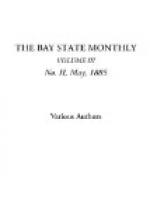Now, Socialism holds that the impending reconstruction of society, which Huxley predicts, will be brought about by the logic of events, and teaches that the coming revolution, which every intelligent mind must foresee, is strictly an evolution. Socialists of this school reason from no assumed first principle, like the French, who start from “social equality,” or like Herbert Spencer, who lays it down as an axiom that “every man has freedom to do all that he wills, provided he infringes not the like freedom of every other man;” but basing themselves squarely on experience,—not individual but universal experience,—they can, and do present clear-cut, definite solutions.
It is this true German Socialism which Mr. Gronlund, in the work previously alluded to, very clearly presents, and which should be more generally understood than it is.
Apropos of the subject, it will not be amiss to recall a statement made by Frederic Harrison, namely:—
“The working-class is the only class which is not a class. It is the nation. It represents, so to speak, the body as a whole, of which the other classes only represent special organs. These organs, no doubt, have great and indispensable functions, but for most purposes of government the state consists of the vast laboring majority. Its welfare depends on what their lives are like.”
And this from Carlyle:—
“It is not to die, or even to die of hunger that makes a man wretched; many men have died; all men must die. But it is to live miserable, we know not why: to work sore and yet gain nothing; to be heartworn, weary, yet isolated, unrelated, girt in with a cold universal Laissez-faire.”
* * * * *
AMONG THE BOOKS.
It seems but a short time since we pored interestedly over the pages of Mr. Stanley’s “Through the Dark Continent,” which described the exploration of the Congo in 1876-7, from Nyongwe to the Atlantic Ocean. The final results of that first expedition, which surpasses all anticipation, are now recorded in two handsome volumes from the same pen, bearing the title: The Congo and the Founding of Its Free State.[4] When Mr. Stanley, in 1878, had crossed the African continent and had reached the mouth of the Congo, he took ship for Europe. He had reached Marseilles, where, in the railway-station, he was met by two commissioners who had been sent by Leopold II., King of the Belgians, for the express purpose of interesting Mr. Stanley in the project entertained by that king of founding a State in the heart of Africa. This project was subsequently accepted, and all the powers of Europe entered into the scheme. Mr. Stanley now relates, for the first time, the story of the founding,—a story which is as entertaining as the liveliest piece of fiction, and as marvellous in its unfolding as would be the sudden discovery of a new and habitable world.




